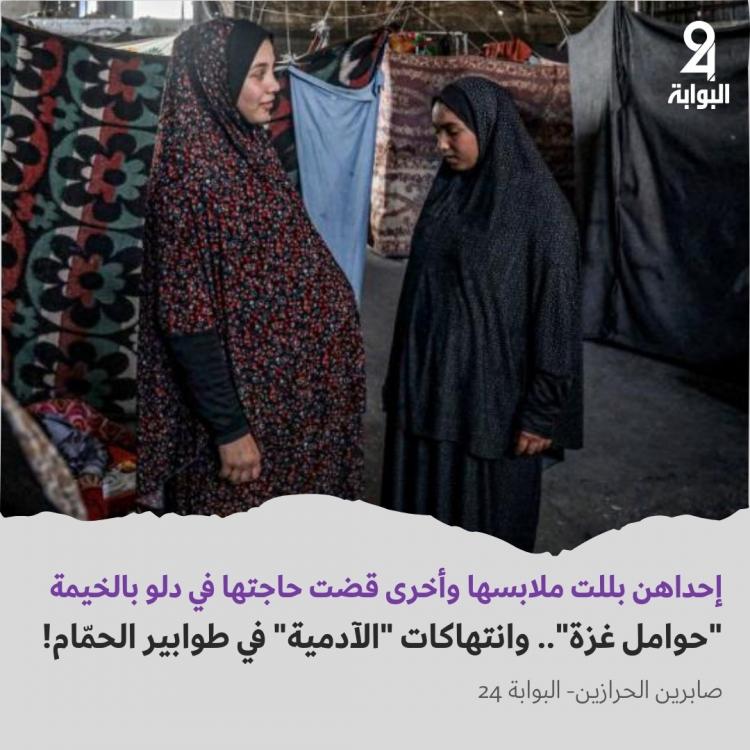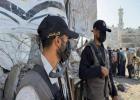غزة/ البوابة 24- صابرين الحرازين
تمنّت لو أن الأرض تنشق لتبتلعها، فما حدث معها لا يمكن أن يتصوّره عقل، أو أن يتخيّله عاقل. حامل في شهرها التاسع، داخل خيمةٍ متهالكة في ساحة مستشفى شهداء الأقصى بمدينة دير البلح، وسط قطاع غزة، وحيدة، تقضي حاجتها في دلوٍ فارغ!
تقول سماح: "كان الحمام محجوزًا. إحداهن كانت تستحم، وكان من الصعب أن أطالبها بالإسراع أو الخروج فورًا، حتى لو أخبرتها أنني حامل".
في قطاع غزة، وتحت الإبادة المتواصلة منذ أكثر من 14 شهرًا، تعيش حوامل غزة، معاناةً لا توصف، تمتد إلى أدق تفاصيل حياتهن اليومية، وسط أجواء النزوح والقصف المستمر، إذ لا تتوقف صعوبة الواقع عند الآلام الجسدية الناجمة عن الحمل، بل تتجاوز ذلك لتشمل ظروفًا أشد قسوة، تنتهك حقوقهن الإنسانية، وكرامتهن، وصحتهن النفسية أيضًا، وأقرب مثالٍ يُساق على ذلك "طوابير الحمام".
تجد الحامل نفسها في الخيام المكتظة والمدارس التي تحولت إلى ملاجئ، أمام تحديات غير متوقعة، أبرزها "الحمامات والمراحيض المشتركة"، التي تفتقر إلى الخصوصية والنظافة والمساحات الآمنة، وتحتاج للوصول إليها الوقوف في طوابير طويلة، ضمن مشهدٍ يومي، يعكس حجم المأساة، ويفقدها "الأولوية" في ظل الازدحام والفوضى.
تضيف السيدة بحرقة: "في الطابور، أجد نفسي في مواجهةٍ معركةٍ أخرى. الطريق إلى الحمام بعيد، وهناك أقف فترةً طويلة في انتظار دوري، نظرات الناس هناك تؤرقني، وأسئلتهم تغيظني وتخنقني، ولو طلبتُ من إحداهن خجلًا تقديم دوري عليها لخصوصية وضعي لا أجد تنازلًا أبدًا".
تمنع سماح (التي اكتفت بذكر اسمها الأول) نفسها عن شرب الماء طوال الليل، خشية أن تضطر لاحتياج المرحاض، قائلةً: "وإن احتجت لذلك، أفعلها في دلوٍ قديم خشية البرد، وتحسبًا لقصفٍ مفاجئ قد يودي بي وبجنيني معًا".
وكان صندوق الأمم المتحدة للسكان في فلسطين، حذر نهاية أكتوبر/ تشرين أول الماضي، من أن أكثر من 17 ألف امرأة حامل في قطاع غزة، يعشن على حافة المجاعة، ووسط ظروفٍ لا إنسانية تهدد صحتهن وصحة أجنتهن، متطرقًا إلى ضعف خدمات المستشفيات فيما يتعلق بموضوع التوليد والعمليات القيصرية، وانعدام احتياجات الخصوصية والصحة العامة للنساء الحوامل في القطاع.
في أحد الصفوف الأرضية، بمدرسة دير البلح الابتدائية، وسط قطاع غزة، تسكن نجلاء (هي الأخرى اكتفت بذكر اسمها الأول لحساسية الموضوع)، وتصف تجربتها مع الحمامات المشتركة بمرارة، فتقول: "هم كبير والله".
نجلاء، الحامل في شهرها التاسع، تحدثت باستفاضة عن أوضاع حوامل غزة في الأيام الأخيرة التي تسبق الوضع، من حيث عدم القدرة على التحمل فيما يتعلق بقضاء الحاجة، "لا سيما في ظل عدم وجود حمامات في الطوابق السفلية، ما يضطرني للصعود إلى الأعلى من أجل الوصول للحمامات، وحينها يكون خمسة أو ستة يصطفون في الطابور" تضيف.
وتتابع بقهر شديد: "مرات كثيرة لم أتمالك فيها نفسي. أعود أدراجي ودموعي تسبقني، كيف يمكن أن يحدث لنا هذا؟ كيف يمكن أن تمتهن كرامتنا إلى هذا الحد؟".
تبدي نجلاء تخوفًا كبيرًا من فكرة الميلاد القيصري، وهو الطريقة المرجحة لولادتها بعد عدة أيام، وتتساءل: "كيف سأتمكن من زيارة الحمام في الأعلى كل ساعة، بينما بطني مفتوحة، والأربعينية على الأبواب؟".
وتعاني نجلاء من قلة النظافة في حمامات المدرسة، حيث أصيبت بالالتهابات بسبب البكتيريا في الحمام الذي يستخدمه عدد كبير من النازحين في نفس المدرسة. تقول: "لا أستطيع تعقيم الكرسي كل مرة. أستخدمه كما أجده لأنني مستعجلة، ولهذا أصاب دائمًا بالالتهابات الشديدة".
على ذكر الالتهابات، ترقد أميرة بركة على سرير المرض في مستشفى شهداء الأقصى، يحاصرها الألم من كل جانب، تعاني من التهابات ودم في البول تزداد نسبته وتقل بالإضافة لفقر الدم، الذي أصيبت به لنقص التغذية.
تقول: "جنيني يأكل من عظمي ودمي، وأنا هنا أنهار. غير سوء التغذية، أصعب ما نمر به نحن الحوامل هو زيارة الحمام".
تتحدث أميرة عن شجارات كثيرة تحدث بين النساء في طابور انتظار الدور أمام باب الحمام المشترك، في مخيمات النزوح، لا تتنازل واحدة عن دورها لأي أحد مهما كان ظرفه، "لا مسنة وطفل ولا حامل ولا مريضة ولا ذات إعاقة. الدقيقة هنا فارقة مع من يحتاج إلى المرحاض بشدة" تعلق.
أصعب ما تعيشه السيدة الحامل في شهرها السابع، أن يصلها الدور، فيبدأ الطرق على الباب. تضيف: "ساعتها أخرج بنفسية محطمة. بإحراجٍ ليس بعده إحراج".
تعاني أميرة أيضًا، من إمساكٍ شديد، نتيجة منع نفسها من دخول الحمام لفترات طويلة، وقلة شربها للمياه، كي لا تضطر إلى ذلك في فترات متقاربة.
طبيب النساء والتوليد في مستشفى ناصر بخانيونس، جنوبي قطاع غزة، الدكتور أحمد الرقب، أكد لـ"البوابة 24" أن عدم توفر المياه النظيفة للشرب، بالإضافة إلى الاضطرار لدخول الحمامات المشتركة في مخيمات ومراكز النزوح، هي أهم أسباب إصابة النساء بالتهابات المسالك البولية، والالتهابات النسائية.
وأضاف: "هذا الوضع أدى إلى تفشي العديد من الأمراض، وأبرزها الالتهابات المهبلية والبولية والفيروسية"، موضحًا أن هذه الالتهابات غالبًا ما تؤدي إلى الولادة المبكرة، ما يشكل خطرًا على حياة وصحة الأم والجنين الذي قد يحتاج لحضانة "تفتقر حاليًا لمعايير السلامة والتعقيم".
وبين الدكتور الرقب أن الحرب فاقمت من أمراض الحمل، مثل ارتفاع ضغط الدم وسكري الحمل والتشوهات الخلقية، بالإضافة إلى النزيف، والمشيمة الملتصقة أو المتزحلقة، وهي حالات خطرة تهدد حياة المرأة، مشددًا على أهمية النظافة الشخصية للمرأة الحامل كحل أولي.
وقال: "لا بد من ارتداء الحامل للملابس النظيفة يوميًا، واستخدام الفوط اليومية للحد من الالتهابات"، مستدركًا: "لكن هذا غير متاح يا للأسف حاليًا في مراكز النزوح وخيامه. نحن نتحدث عن إجراء احترازي نتمنى تطبيقه قدر المستطاع، كحل واقعي وفي متناول اليد لمن تستطيع ذلك"، مطالبًا بتحسين المرافق الصحية، لا سيما ما يتعلق بتوفير حمامات نظيفة للنساء، لتجنب استمرار معاناتهن في طوابير الحمامات المشتركة داخل مراكز الإيواء.
وأشار إلى أن الأوضاع الحالية تتطلب اهتماماً فورياً بالرعاية الصحية الأولية والعمل على تفعيل النقاط الطبية المختصة لمتابعة النساء بشكل دوري، وتوفير احتياجاتهن قدر المستطاع، وجعلهن أولوية في أي حلول مطروحة على صعيد القطاع الصحي. "تعاني المستشفيات المتاحة، مثل ناصر، والهلال، والعودة، والأمريكي، من ضغط شديد، حيث تستقبل ناصر وحدها يوميًا، ما بين 24 و30 حالة ولادة يوميًا" يعقب.
ويطالب الدكتور الرقب، بضرورة توفير الفيتامينات والحديد للحوامل في جميع المناطق بشكل عادل، وتعزيز دور وزارة الصحة في تحسين الرعاية الصحية، وتوفير الاحتياجات الأساسية بشكل عاجل، "بالإضافة إلى تكثيف الجهود الدولية لإنهاء الصراع، وضمان حياة كريمة لجميع السكان" يختم.
One Woman urinates at Herself, Another Used a Bucket in the Tent “Pregnant Women of Gaza" and the Violations of "Human Dignity" in Bathroom Queues!
Gaza / Al-Bawaba 24 - Sabreen Al-Harazin
She wished the ground would swallow her up; what happened to her is unimaginable, the nine months pregnant, alone in a dilapidated tent in the courtyard of Al-Aqsa Martyrs Hospital in Deir al-Balah, in the middle of Gaza, she finds herself indeed of using a bucket to make water. Samah says: ‘The bathroom was busy, one woman was taking a shower, and it was difficult for me to ask her to hurry or leave immediately, even if I told her I was pregnant.”
In Gaza, under the continuous bombardment for more than 14 months, pregnant women are experiencing indescribable suffering, affecting even the most delicate details of their daily lives amid ongoing displacement and constant shelling. The harsh realities go beyond the physical pains of pregnancy to encompass even more brutal conditions that violate their human rights, dignity, and mental health. One glaring example is the ‘bathroom queues.”
Pregnant women find themselves in overcrowded tents and schools that have turned into shelters, facing unexpected challenges, primarily "shared bathrooms" which lack privacy, cleanliness, and safe spaces. Besides to reach them, Pregnants must stand in long lines, creating a daily scene that reflects the magnitude of their tragedy, stripping them of "priority" amid the chaos and confusion.
The woman continues passionately: "In the queue, I find myself facing another battle. The way to the bathroom is long, and I stand there for a long time waiting for my turn; the stares from women there torment me, and their questions irritate and suffocate me. Even if I shyly ask one of them to let me go ahead due to my condition, I never find anyone willing to compromise.”
Samah, who chose to mention only her first name, refrains from drinking water all night for fear of having to use the bathroom, saying, "If I need to, I end up using an old bucket for fear of the cold and sudden shelling that could take both me and my baby.”
The United Nations Population Fund in Palestine warned at the end of October that more than 17,000 pregnant women in Gaza are living on the brink of famine, amid inhumane conditions that threaten their health and that of their fetuses. They pointed to the insufficient hospital services regarding childbirth and cesarean operations, and the lack of essentials for privacy and public health for pregnant women in the area.
In one of the ground-floor classrooms at Deir al-Balah Elementary School, Najla (who also chose to mention only her first name due to the sensitivity of the topic) bitterly describes her experience with the shared bathrooms: "It's a big problem, I swear.”
Najla, in her ninth month of pregnancy, elaborated on the conditions of pregnant women in Gaza in the days leading up to childbirth, particularly the inability to bear the need to urinates, "especially since there are no bathrooms on the lower floors, which forces me to climb up to get to them, and when I do, there are five or six women waiting in line.
She adds with a deeper compulsion: "Many times I've lost control. I go back with tears streaming down my face; how could this happen to us? How could our dignity be devalued to this extent.”
Najla expresses significant concern about the possibility of a cesarean delivery, which is expected to be the method of her childbirth in just days, questioning, "How will I manage going to the bathroom upstairs every hour while my abdomen is open, and the bitter cold winter is approaching?”
She suffers from a lack of cleanliness in the school's bathrooms, having contracted infections due to bacteria in the restroom used by a large number of displaced people in the same school. She states, "I can't sanitize the bathroom seat every time. I use it as I find it because I'm in a hurry, and that’s why I keep suffering of severe infections.”
Because of infections, Ameera Barakah lies at Al-Aqsa Martyrs Hospital, pain makes her very tired. She suffers from infections and blood in her urine, alongside anemia due to malnutrition.
She laments: "My fetus is feeding on my bones and blood, and here I am emaciating. Beyond malnutrition, the hardest thing we pregnant women face is visiting the bathroom.”
Ameera recounts numerous fights between women waiting for their turn in front of the shared bathroom door in the displacement camps; no one ever relinquishes their spot for anyone, regardless of their circumstances, "No exceptions for the elderly or the child, nor the pregnant, nor the sick, nor the disabled. Every minute is critical for those in dire need to enter the bathroom,"
She remarks “The hardest moment for a woman who is seven months pregnant is when it’s her turn, and then she hears knocking on the bathroom door. She adds: “In that moment, I come out feeling crushed. It’s a shameful and embarrassing thing beyond.
Ameera also suffers from severe constipation due to depriving herself of using the bathroom for long periods and drinking little water to avoid frequent bathroom trips.
Dr. Ahmed Al-Raqab, an obstetrician at Nasser Hospital in Khan Younis, southern Gaza, confirmed to "Al-Bawaba 24" that the lack of clean drinking water, along with the necessity to use shared bathrooms in camps and shelters, are the main causes of urinary tract infections and gynecological infections among women.
He added, “This situation has led to the spread of many diseases, the most notable of which are vaginal and urinary infections, which often lead to preterm births, posing risks to the health and lives of both the mother and the fetus; the latter may require incubators that currently lack safety and sterilization standards.”
Dr. Al-Raqab explained that the war has exacerbated pregnancy-related diseases such as high blood pressure, gestational diabetes, and congenital malformations, in addition to hemorrhaging and placental attachment or detachment, which are dangerous conditions that threaten women's lives. He emphasized the importance of personal hygiene for pregnant women as a preliminary solution.
He stated, “Pregnant women must wear clean clothes daily and use sanitary pads to minimize infections,” but added, “Unfortunately, this is currently unavailable in the shelters and their tents. We are talking about a precautionary measure that we hope can be implemented as much as possible, as a realistic and accessible solution for those who can afford it.” He called for improving health facilities, especially concerning providing clean bathrooms for women, to avoid the continued suffering in queues for shared bathrooms in shelters.
He noted that the current conditions require immediate attention to primary healthcare and action to activate specialized medical points to regularly follow up on women’s health, providing their needs as much as possible and making them a priority in any solutions proposed in the healthcare sector. “The available hospitals like Nasser, Al-Hilal, Al-Oud, and the American Hospital are under immense pressure, as Nasser alone receives between 24 to 30 births daily,” he remarked.
Dr. Al-Raqab calls for the necessity of providing vitamins and iron for pregnant women equitably across all areas, enhancing the role of the Ministry of Health in improving healthcare, and urgently supplying essential needs, “in addition to intensifying international efforts to end the conflict and ensure a dignified life for all residents,” he concluded.
Al-Bawaba 24
Gaza / Al-Bawaba 24 - Sabreen Al-Harazin
البوابة 24







